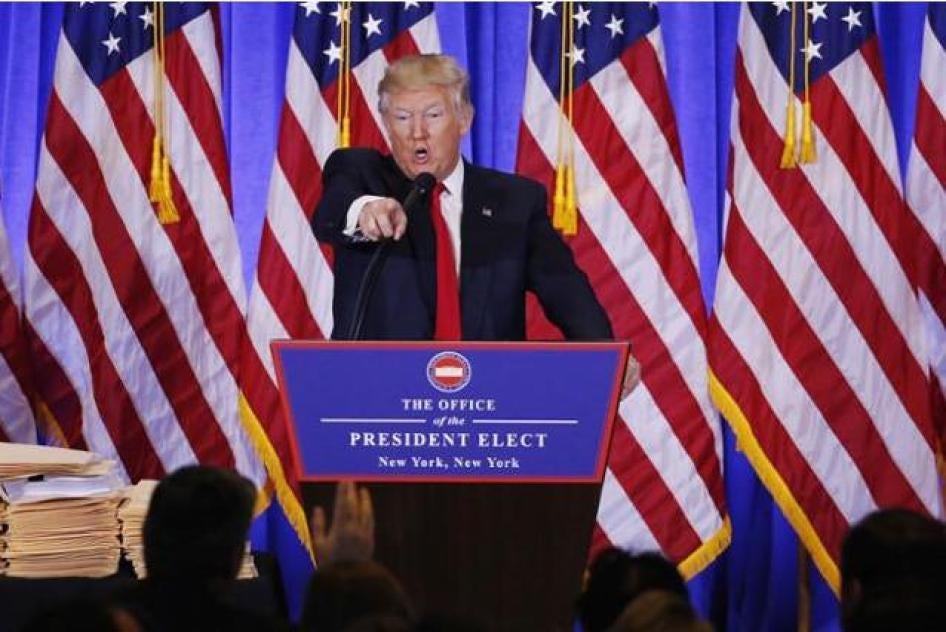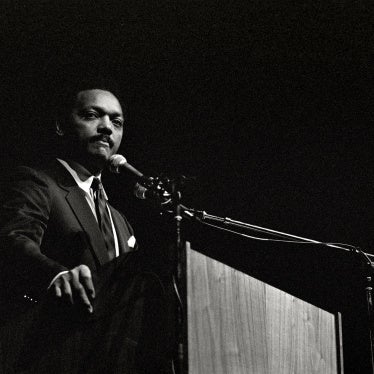I have spent three decades defending human rights around the world. I have seen the many ways that human rights and democratic principles get trampled or undermined. In the United States, I have fought abusive policies by Democratic and Republican presidents alike. Having seen so much, I am not prone to hyperbole. But for the first time, I am worried for the future of America’s democratic system.
U.S. President Donald Trump is still in the early days of his presidency, but a number of his actions have set off warning bells for me. It is not clear that he appreciates and accepts the checks and balances and day-to-day accountability that are essential parts of democracy.
In other parts of the world, I have seen a lack of such appreciation erode democracy, its form respected but its substance undermined. I have seen democratically elected leaders use their popularity to silence the media, rein in civil society, compromise the judiciary and curtail the public’s ability to limit executive overreach. To avoid this unraveling, I have come to understand the importance of not only democratic laws and institutions but also democratic culture.
Trump has already shown contempt for this culture. Rather than mount a serious defense of his policies, he has contorted the truth ― even lied. Rather than answer critical media questions, he has called journalists enemies. Rather than simply disagree with a judicial ruling, he has disparaged a “so-called judge” for having the temerity to rule against him. Rather than respect internal dissent, he has tried to sidestep or silence it. Rather than open his finances to scrutiny, he has hidden his tax returns and refused to separate himself from his business interests.
Without these checks, Trump seems susceptible to the classic populist claim that his insight into the will of “the people” justifies trampling on the rights of real people ― perhaps the most important limits on presidential power. That tendency was already on display during the campaign. Instead of respecting the individual differences of a diverse society, Trump belittled those who value that diversity.
Now that he is in the White House, the consequences are already being felt. Trump’s sweeping ban on travel to the United States, issued without any effort to tailor it to an actual terrorist threat, would impose enormous hardship on tens of thousands of people, mostly Muslims, whose visas would suddenly be worthless. His suspension and radical reduction of refugee admissions to the United States is felt by many of the world’s most helpless people.
His threatened deportation of undocumented migrants ― anyone who entered the United States unlawfully would qualify ― could uproot millions of people with deep family and community ties. And he is substantially cutting back on the procedures that allow migrants to cite those ties in an effort to avoid deportation.
He has nominated a Supreme Court justice who espouses a concept of “religious liberty” that has been used to justify discrimination against gays and lesbians. Women’s access to abortion and basic health services is in jeopardy. People in ill health fear loss of their newly won health insurance. And though he now appears to have backed away, the president has casually toyed with resuming torture.
Yes, Trump won the Electoral College and thus the presidency. Yes, millions of people who felt government was not serving them voted for a man who vowed to shake things up. But “draining the swamp” should not come at the expense of the rights and protections that represent America’s highest aspirations.
Most people in the United States have no experience with autocratic government, but experience elsewhere teaches us that it can arrive with extraordinary speed, signaled not by tanks surrounding the presidential palace but by the erosion of democratic norms. We may take comfort in the strength and vigor of the U.S. democratic system, with its many checks and balances, but we should resist complacency, because each has its fragility.
A professional, free and fair press, for example, has a vital role to play, but it is not immune to official intimidation or the diversion of “alternative facts.”
A fiercely independent judiciary is essential, but judges are susceptible to pressure and intimidation. They will need courage to defend rights if the president persists in promoting abusive policies.
Many organizations and grassroots movements are showing signs of vitality in defense of rights but will need organization and solidarity across affected communities and party lines, the discipline to be guided by principle rather than mere opposition and endurance.
Government officials throughout the executive branch have already begun to speak out, some at the risk of their jobs. That highest form of public service should continue even if surveillance and attacks on whistleblowers make dissent difficult.
And, of course, elected officials ― foremost, the members of the president’s own party ― have essential responsibilities. We have become inured to partisanship in an era of divided government, but when fundamental democratic values are at stake, petty politics should be set aside.
The rest of the world can help, too. Given America’s power, there is a tendency to come to terms with its leader, whoever that is. But the United States has influence beyond that of any other nation. All rights-respecting governments have an interest in promoting a positive U.S. example.
While Trump is heading in a dangerous direction, it is too soon to say where he will end up. The U.S. democratic system is still strong. But the time for heightened vigilance is now. The responsibility falls on us all.










